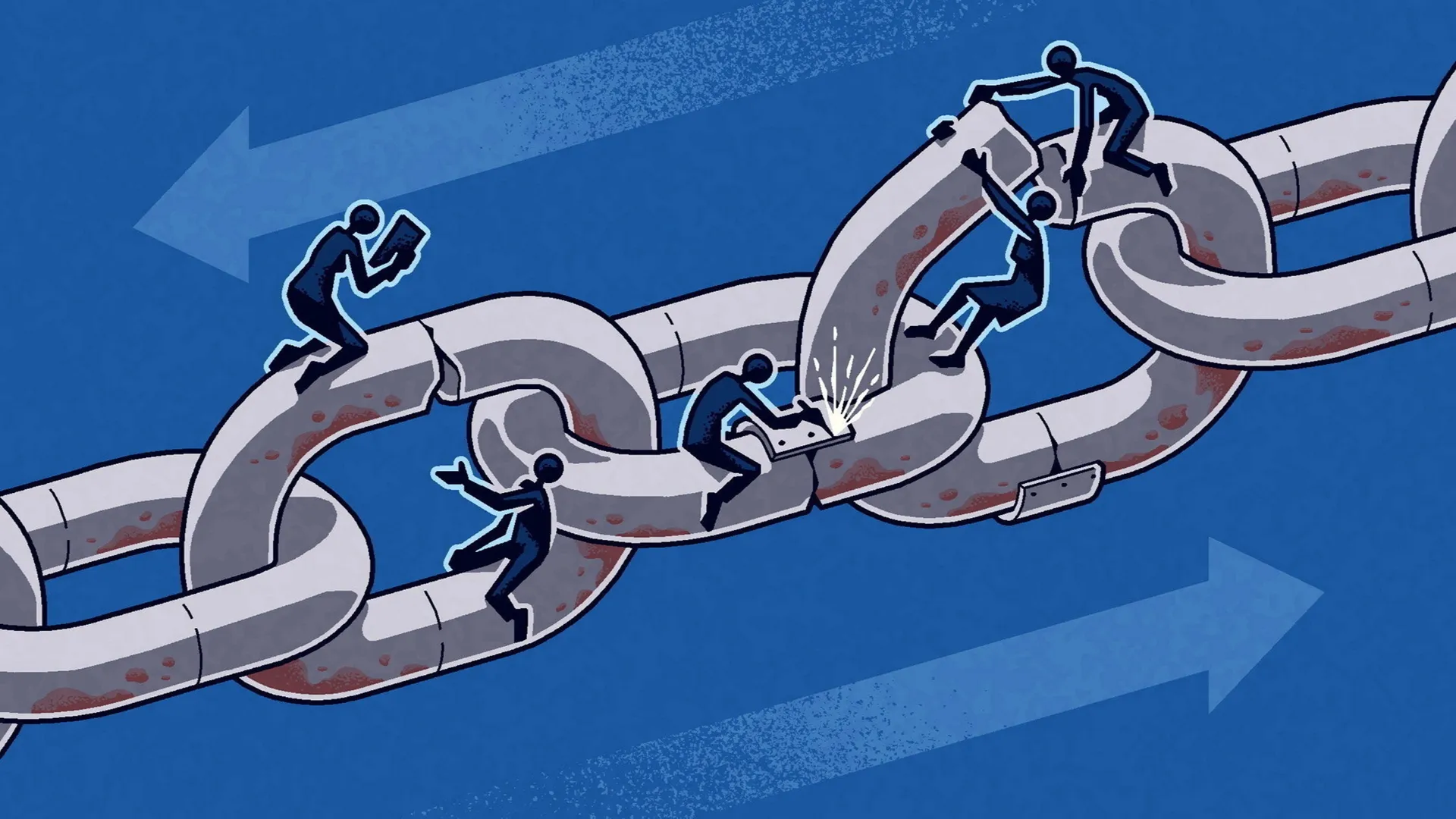尊敬的用户您好,这是来自FT中文网的温馨提示:如您对更多FT中文网的内容感兴趣,请在苹果应用商店或谷歌应用市场搜索“FT中文网”,下载FT中文网的官方应用。

The American economy remains relatively strong, but concerns about its security linger. From the Biden-Harris administration’s opposition to Nippon Steel acquiring US Steel, to proposed tariffs on Chinese cranes that might be used for digital surveillance, to worries about access to rare earth minerals and component parts for crucial industries controlled by adversaries, it’s clear that creating more resilient supply chains is a key issue. And it will remain so no matter who wins the presidential election in November.
美国经济仍然相对强劲,但关于其安全的担忧仍然存在。从拜登-哈里斯(Biden-Harris)政府反对日本制铁(Nippon Steel)收购美国钢铁(US Steel),到提议对可能被用于数字监视的中国起重机施加关税,再到对由对手控制的稀土矿和关键行业零部件获取渠道的担忧,可以明确地看出,创建更具韧性的供应链是一个关键问题。而且,无论谁在11月的总统选举中获胜,这个问题都将继续存在。
It’s also a topic that will get lots of air time this week in Washington, with the commerce department hosting a supply chain summit and convening a series of meetings with US industry, foreign allies, academics and civil society to discuss how to identify and manage systemic risks in supply chains.
这也是本周在华盛顿备受关注的话题,因为美国商务部将举办供应链峰会,并召集美国工业界、外国盟友、学者和民间社会举行一系列会议,讨论如何识别和管理供应链中的系统风险。
This is part of an effort led by US commerce secretary Gina Raimondo, who told me last week that the biggest surprise of her tenure was learning “just how unprepared the federal government was to identify and react to supply chain disruptions, and how unsophisticated the approach to this has been for so long”.
这是由美国商务部长吉娜•雷蒙多(Gina Raimondo)领导的努力的一部分,她上周告诉我,她任职期间最惊讶的发现是“联邦政府在识别和应对供应链中断方面毫无准备,而且长期以来对此问题的处理方式如此不成熟”。
Part of this is down to the fact that the entities holding the best and most granular information about supply chains are private companies. They tend to be looking for individual risks in specific areas, rather than systemic issues across the economy. Governments, on the other hand, may be able to identify the need for more resilience in areas that are crucial for economic or national security — such as semiconductors or pharmaceuticals — but have little understanding of the particulars of each supply chain, or how they might interact with areas like logistics, transport, energy or power in the midst of a crisis.
部分原因在于掌握最佳和最详细供应链信息的实体是私营公司。它们往往寻找特定领域的个别风险,而不是整个经济体系的系统性问题。另一方面,政府可能能够确定在经济或国家安全关键领域(如半导体或制药)需要更强韧性,但对每个供应链的具体情况、以及它们在危机中如何与物流、运输、能源或电力等领域相互作用了解甚少。
This asymmetry was on full display during the pandemic, of course, which is why Raimondo has repositioned the commerce department to focus on supply chains. A key pillar of that effort has been the development of much more robust data analysis to track exactly where the potential chokepoints in the US economy are.
当然,在疫情期间,这种不对称性得到了充分展示,这也是雷蒙多将商务部的重点转向供应链的原因。该努力的一个关键支柱是开发更强大的数据分析,以准确追踪美国经济潜在的瓶颈。
To this end, the department has developed the Scale Tool, a computational system which includes data from the entire American goods economy. This is identified and ranked across various industries, geographies and risk metrics (geopolitical, environmental, national security, public health, and so on). The aim is to create an extremely granular picture of where vulnerability and resiliency in the American economy actually lies.
为此,该部门开发了Scale Tool,这是一个计算系统,包括整个美国商品经济的数据。这些数据根据不同的行业、地理位置和风险指标(地缘政治、环境、国家安全、公共卫生等)进行识别和排名。目标是创建一个极其详细的图景,揭示美国经济中的脆弱性和韧性所在。
That has required Raimondo and her officials to become familiar with things as esoteric as, for example, the components that go into an AI data centre cooling system. While it’s been widely understood for some time that AI capacity was a potential point of vulnerability for the US, this was thought of mainly in terms of the large amounts of power required for data centres, and whether the grids supporting them were resilient.
这就要求雷蒙多和她的官员们熟悉业内知识,比如用于人工智能数据中心冷却系统的组件。虽然人们很早就普遍认识到人工智能能力是美国的一个潜在薄弱点,但主要是考虑到数据中心所需的大量电力,以及支持它们的电网是否具有韧性。
But in her discussions with chief executives, Raimondo began to understand that the physical structures of the centres were themselves a potential chokepoint. “I realised that the buildings themselves were really sophisticated and that we were going to have to get into the weeds of things like cooling systems, racks and components.”
但在与首席执行官的讨论中,雷蒙多开始意识到中心的物理结构本身可能成为一个瓶颈。“我意识到这些建筑本身非常复杂,我们将不得不深入研究诸如冷却系统、机架和组件之类的细节。”
When the team ran the case through the Scale Tool, what they discovered both validated and added to the anecdotal information coming from industry. Not only does America face potential shortages in cooling components, but the country needs more back up diesel engines in case of grid failure.
当团队将案例通过Scale Tool分析案例时,他们发现这不仅验证了来自行业的传闻信息,还增加了这类信息。美国不仅面临着冷却部件可能短缺的问题,而且需要更多备用柴油发动机以备电网故障。
The example, one of many, illustrates the need to use both qualitative and quantitative data from industry and the public sector to truly understand supply chain risk. While many economic security conversations are highly political — the Nippon Steel case being a good example — real vulnerabilities tend to come from unexpected places, interacting in ways that no single policymaker or business person could predict.
这只是众多例子之一,它说明了需要同时使用来自行业和公共部门的定性和定量数据,才能真正理解供应链风险。尽管许多经济安全的讨论都是高度政治化的,比如日本制铁的案例,但真正的脆弱性往往来自意想不到的地方,以一种没有任何单一决策者或商业人士能够预测的方式相互作用。
What we know is that there are plenty of economy-wide risks that have yet to be understood or addressed. Data from the commerce department indicates that 57 per cent of industries in America would require six months to return to normal capacity if there was even a single week of transport disruption. So much for the much-heralded shift from “just in time” to “just in case.”
我们所知道的是,还有很多全面经济风险尚未被理解或解决。美国商务部的数据显示,如果发生一周的交通中断,美国57%的行业需要6个月才能恢复正常产能。声势浩大的从“及时制造”向“备用制造”的转变,所得的结果也不过如此。
Likewise, there are unexpected areas of workforce and trade vulnerability that couldn’t have been predicted without burrowing deep into granular data down many levels of global supply chains.
同样,在劳动力和贸易脆弱性方面还有一些意料之外的领域,如果不深入挖掘全球供应链的多个层次的细致数据,是无法做出预测的。
Ideally, more data would allow policymakers to send the kind of highly targeted demand signals to industry (via more specific and surgical fiscal subsidies or tax incentives) that would increase resilience while not distorting the overall economy or trade system. They might also be used to improve the efficacy of trade negotiations with allies, and dismantle silos in intra-agency policymaking. And I’d love to see the White House Competition Council, which includes commerce, trade, Treasury, transport and other departments, using tools like this to create better policy.
理想情况下,更多的数据可以使决策者向工业界发送高度针对性的需求信号(通过更具体和精确的财政补贴或税收激励),从而增加韧性,同时不扭曲整体经济或贸易体系。它们还可以用于改善与盟友贸易谈判的效力,并消除机构内部政策制定中的壁垒。我希望看到包括商务、贸易、财政、交通等部门在内的白宫竞争委员会(White House Competition Council)利用这样的工具来制定更好的政策。
In economic security, as in anything else, data is power.
在经济安全领域,就像在其他任何领域一样,数据就是力量。